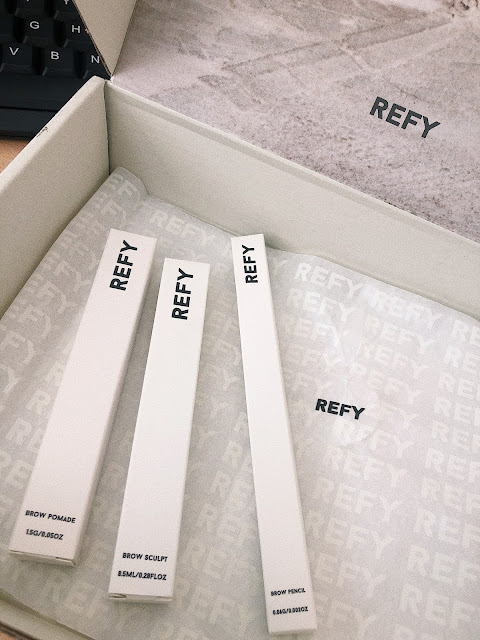The Future of Influencer Brands
I recently fell prey to the Refy Beauty hype, and it got me asking myself, what makes us buy into an influencer brand?
Founded in 2019 by Instagram influencer Jess Hunt, Refy Beauty is the perfect assimilation of Hunt’s Instagram aesthetic and her, undisputedly, incredible eyebrows. Bringing back Cara Delevigne circa 2012 vibes, its no surprise Hunt’s first launch focussed on her three stage brow routine, that consumers could buy individually, or as part of the collection.
The chic, monochromatic packaging has been in the hands, and brows, of almost everybody who's anybody on the Instagram platform. I really liked the products, the Brow Sculpt I will most definitely purchase again, and as a beauty lover, really enjoyed the ingenuity of someone bringing something a bit different to the market.
The brow sculpt has a built in, concealed brush that after applying the product, can be used to fluff up the brows and the pomade is cleverly pressed into the lid of an angled brow brush. You can tell the products have been made by someone that grew tired of numerous products in, what should be, a fairly simple routine and were created under the watchful eye of Hunt, who knew exactly what she was looking for in each of the products.
All in all, it’s an influencer brand that has been executed very, very well.
As the future of Instagram is, admittedly, uncertain, it makes perfect sense for influencers to capitalise on their followings to create their own brands that give them their own, autonomous assets that aren’t, so directly, tied to a personal brand or the ticking-time-bomb future of a social media platform.
But are these brands successful without the influencing figurehead behind them?
We’ve seen this with the likes of Jamie Genevieve’s Vieve, Sarah Ashcroft’s SLA and Molly Mae’s Filter, where influencers have successfully launched brands that are successful in their own right, and give influencers another revenue stream that will, in theory, out live their own influencing.
It feels like the goal with many of these brands is that of protection. If Instagram, was, to disappear overnight, these brands will offer an alternative revenue stream that’s success isn’t dependent on an inherent association with the influencer behind them.
But are these brands as stand-alone as we may think? I think for me, buying into an influencer brand, I’m undoubtedly influenced by the influencer themselves who I perceive to be of not only the spearhead of the brand, but a good judge of quality. We all know credible influencers wouldn’t put their names to a brand that didn’t meet their own requirements, and so when an influencer launches a brand that feels authentic to them, we as consumers, perceive a certain level of quality.
We know that Jamie Genevieve’s integrity that she maintained throughout her years of honestly documenting beauty reviews and her iconic, grungy style will be evident in her own brand, in the same way we admired Molly Mae’s golden tan and incredible curls on Love Island, we assume that the products she puts her name to will match our expectations.
But without this transfer of meaning, and quality, many influencer brands may not be as stand-alone as we think. It’s interesting to see the aforementioned Vieve now available on Cult Beauty, where the brand bares little mention to it’s namesake.
I think what I’m trying to get at here, is that influencer brands are inextricably linked with the influenceer behind them. The influencer brands I am most likely to buy into are the ones that feel like an extension of the influencer themselves. Why? Because I like them, I like their content, I probably admire their originality and genuineness, I've potentially followed them for years, and thus, I perceive a certain level of brand quality.
It seems influencers, with the uncertainty of the lifespan of a career on instagram, are seeking to create brands that are totally separate to them. But in doing so, may be undermining the brands story, quality and authenticity. For me, buying into an influencer collab, I look for a partnership that appears authentic and a natural fit, with a brand they have a natural affinity for. Creating their own brand elevates this notion, and surely adds even more value.
The likes of Refy Beauty, Vieve and Filter are good examples of brands that seem to be striking the balance between influencer involvement, and creating a brand that is separate their online presence and identity. It's interesting to see how savvy influencers are now navigating the beauty and fashion landscape to work to their (and their brand's) advantage and create a sustainably profitable business.





Comments
Post a Comment